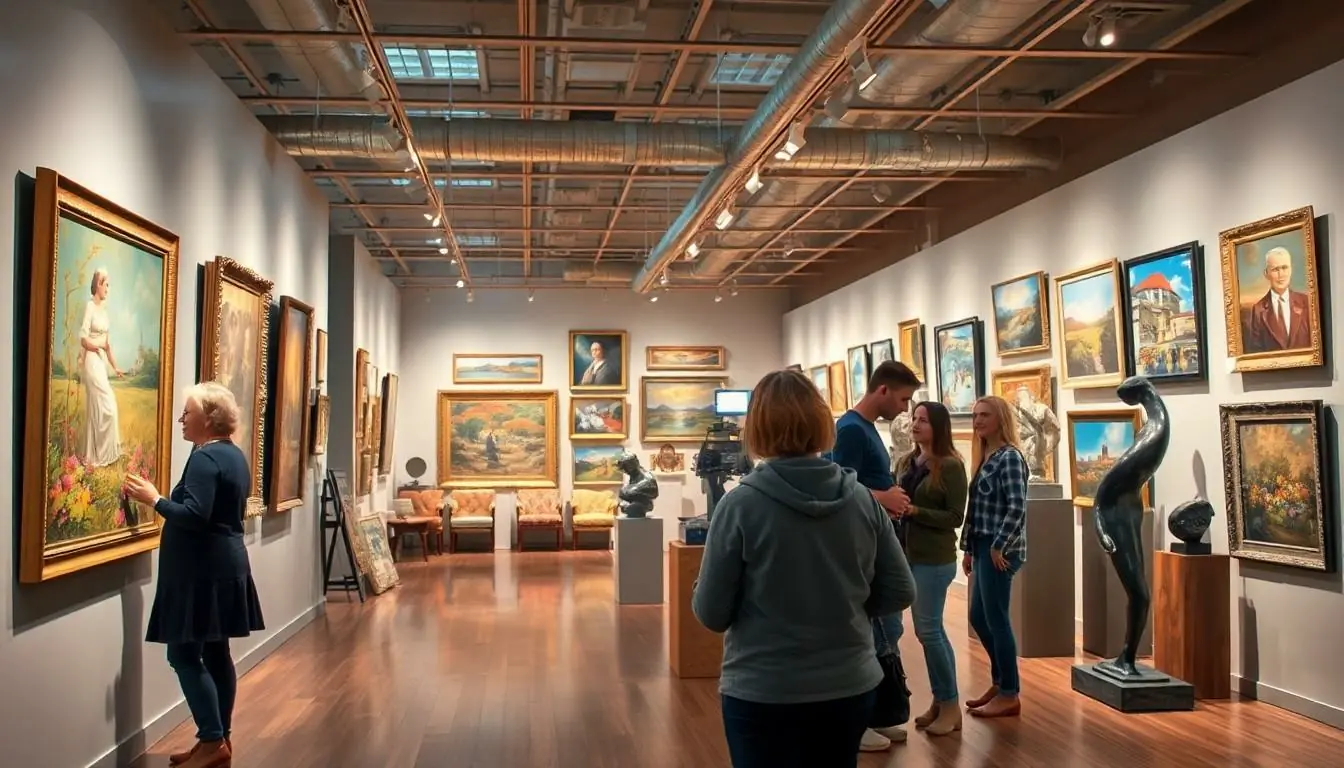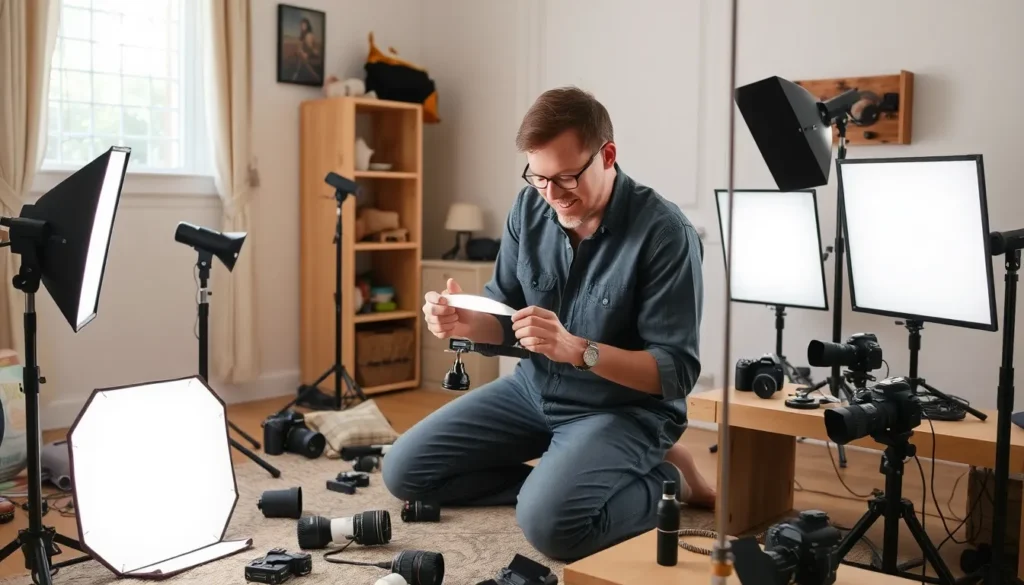Finding the right art gallery to sell your masterpieces can feel like searching for a needle in a haystack. With so many options out there, it’s easy to get lost in the chaos of canvases and sculptures. But fear not! There are art galleries near you eager to showcase your talent and offer you a fair price for your work.
Table of Contents
ToggleUnderstanding Art Galleries That Buy Art Near Me
Exploring local art galleries that buy art provides artists with valuable opportunities. Many galleries focus on promoting emerging talent while valuing unique artistic expressions. Artists can connect with galleries showcasing contemporary pieces, traditional works, or eclectic collections.
Local galleries often host exhibitions, offering a platform to display artwork and connect with art enthusiasts. Finding the right gallery involves considering the gallery’s mission, values, and the types of art they typically purchase. Each gallery has its approach, so researching specific requirements can be beneficial.
Networking within the local art community also plays a significant role in finding art buyers. Engaging with other artists may lead to recommendations about galleries known for purchasing artwork. Social media platforms can serve as effective tools for discovering galleries that actively seek new pieces.
In geographic proximity to artists, versatile galleries often strive to build relationships with local creators. Artists should schedule appointments to discuss their work and understand the purchasing processes. Each meeting represents an opportunity to build rapport and discuss fair compensation.
Most galleries provide submission guidelines, detailing information about the types of works they’re interested in. Understanding these guidelines ensures that submissions align with gallery preferences, enhancing the chances of purchasing agreements.
Having the right marketing materials is essential. Presenting professionally photographed images of artwork alongside an artist’s bio can make a positive impression. Many art galleries frequently update their collections, emphasizing the importance of timely submissions and adaptability in artistic styles.
Types of Art Galleries That Purchase Art

Art galleries vary significantly in their approaches to buying art. Understanding these differences can help artists identify the right opportunities.
Commercial Galleries
Commercial galleries focus on selling art to collectors and institutions. These galleries typically purchase works outright or represent artists on a commission basis. They highlight established artists as well as emerging talent. Negotiations often revolve around pricing strategies and terms of sale. Regular exhibitions serve to attract potential buyers. Sales history plays a crucial role in valuation and selection processes. Artists often benefit from promotional efforts, as these galleries invest in marketing initiatives to enhance visibility.
Non-Profit Galleries
Non-profit galleries prioritize community engagement and artistic exploration. They often receive funding through grants and donations, enabling them to buy artwork directly or host exhibitions. Support for emerging artists is a key mission, providing platforms for unique voices. These galleries tend to focus on education and outreach rather than profit. They frequently collaborate with local organizations for events. Selection processes can be competitive but may offer more opportunities for innovative works. Connections forged through these galleries often lead to longer-term relationships in the art community.
How to Find Art Galleries That Buy Art Near Me
Finding local art galleries that buy art involves utilizing various resources and networks. Artists can explore online platforms and connections within their communities for effective results.
Online Resources
Artists can begin their search with websites dedicated to art sales. Platforms like Artfinder and Saatchi Art provide listings of galleries actively purchasing artworks. Online directories can also feature local galleries and their specific buying criteria. Social media serves as an excellent resource for following galleries and staying updated on their purchasing interests. Artists can engage with gallery posts and see what types of art they currently seek. Additionally, joining online groups focused on regional art communities can lead to valuable tips and recommendations.
Local Art Networks
Networking within the local art scene enhances visibility. Attending community art fairs or exhibitions gives artists direct access to gallery representatives looking for new talent. Volunteer opportunities at local galleries can foster relationships while providing insights into their buying processes. Artists can benefit from reaching out to fellow local artists for referrals to galleries that purchase art. Collaborating with neighborhood creative spaces may also yield new connections and opportunities. Taking part in art-focused events strengthens these networks and opens avenues for selling artwork.
Tips for Selling Your Art
Selling artwork requires careful preparation and consideration. Artists can enhance their chances of success by taking specific steps regarding their art and pricing.
Preparing Your Artwork
Artwork presentation significantly impacts buyer perception. Ensure pieces are clean and ready for display. Consider framing options, as quality frames can elevate the overall look. Think about creating a cohesive body of work that reflects a unique style. Including detailed descriptions helps potential buyers understand the inspiration behind each piece. Providing multiple images, including close-ups and context shots, showcases the artwork effectively. Artists benefit from adhering to the submission guidelines set by galleries.
Pricing Your Art
Pricing artwork appropriately involves research and strategy. Start by analyzing similar pieces within the target market. Consider factors such as materials, size, and time invested. Listing prices for comparable works helps gauge a fair price range. Setting a baseline price that reflects skill and experience establishes credibility. It’s advisable to calculate costs, including production, marketing, and gallery commissions, prior to pricing. Flexible pricing options can attract a broader range of buyers. Consulting with gallery professionals can yield insights into effective pricing strategies.
Finding the right local art gallery can be a transformative experience for artists. By connecting with galleries that value creativity and emerging talent, artists can gain exposure and fair compensation for their work. Engaging with the local art community and utilizing online resources can enhance visibility and lead to fruitful opportunities.
Artists should remain adaptable and proactive in their approach. Understanding gallery missions and submission requirements is crucial for success. With the right preparation and networking, artists can navigate the art world more effectively and build lasting relationships that elevate their careers. Embracing these strategies will help artists thrive in their creative journeys.



